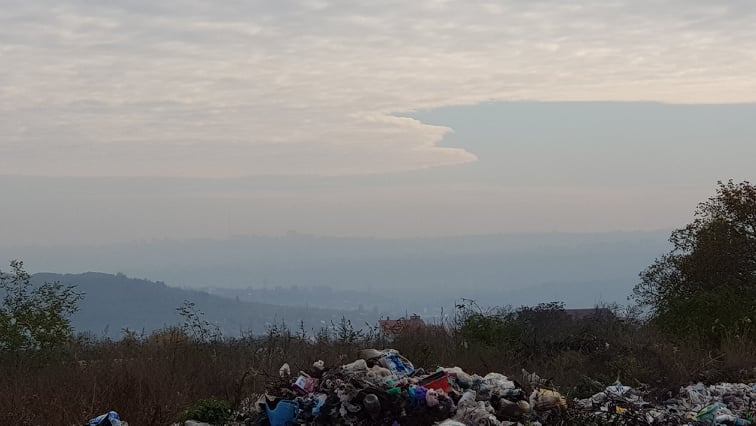Improper waste management is more acute in the Republic of Moldova, this sector generating about 10.7% of greenhouse gas emissions (GHG), compared with global average, of approx. 3%. More, the effects of climate change in the waste management sector may harm other sectors, in particular agriculture, water resources and health, and less directly energy, transport, or forestry.
Thus, according to the National Determined Contribution (NDC) to the Paris Agreement, the Republic of Moldova aims to reduce GHG emissions from the waste sector by 14% by 2030, according to the unconditional scenario, and the conditional scenario plans to reduce 18% of GHGs generated by this sector.
GHG inventory in the waste sector, solutions to mitigate emissions, climate change adaptation and best practices in the field were presented to civil servants and decision-makers in public institutions, as well as to representatives of the private sector and civil society in a practical workshop during three days, organized by the EU4Climate Project, funded by the European Union and implemented by UNDP. At the same time, a guide developed within the project for the integration of climate change in waste management policy was presented.
"The implementation of the NDC in the waste sector requires investment in infrastructure and a careful choice between different technological options that require support through appropriate policy instruments. Local issues must be taken into account when making decisions, and technological selection must go hand in hand with the development of national, local and sectoral policies, as well as capacity building,” the State Secretary in the Ministry of Agriculture, Regional Development and Environment, Valentina Țapeș said at the opening of the workshop.
Annually, through sanitation services, about 1.1-2.2 million tons of waste are transported to urban solid waste landfills from urban localities. A total amount of about 2.8 million tons of waste is generated from the activity of enterprises. In rural areas of Moldova, between 0.3-0.4 kg of waste per capita is generated daily and, respectively, 0.9 kg/capita/day or more in urban areas.
“I certainly welcome the focus on waste management, as this will contribute to achieving the ambitious objectives of the NDC. According to science, particular attention should be put on organic matter when managing waste. In fact, organic fraction of waste landfilled creates methane emissions, which is 25 times more powerful than carbon dioxide at warming the atmosphere. It is worth noting that in many EU Member States, greenhouse gas emissions from waste have fallen sharply in the last years, mainly thanks to the proper implementation of the EU legislation,” said Christian Ballarò, Programme Officer for Energy, Environment and Climate Change at the EU Delegation to the Republic of Moldova.
According to EU4Climate experts, the sector has the potential to achieve 15-20% GES reductions by implementing measures to recycle and recover the material and energy value of waste. These can be achieved by actively applying the principle of "waste hierarchy" and transposing European circular economy directives into national legislation. Research indicates significant mitigations are possible in the efficient use of material and energy resources that has an impact on the entire process of creating added value of products. Of all emissions generated globally, half are related to production and can be reduced by 30% through circular economy measures.
The circular economy is a concept with a major impact on the economy, which similar to that of Climate Change is gradually integrated into all economic sectors and transforms the economy from the ground up. This year's European Green Deal highlights circular economy solutions alongside those aimed at combating climate change. The main circular economy strategies are based on 1. Eliminating product demand or preventing waste generation; 2. Reducing the use of resources; 3. Replacement of materials (eg electricity from renewable sources); 4. Reintroduction into the same production flow; 5. Use in a different flow; 6. Recovery of valuable items (e.g. energy recovery from waste, compost, etc.); and 7. Returning to an environmentally friendly state (treatment or disposal of waste).
"It is necessary to move to a resource efficient and circular development model – which works to reduce waste before it is produced and treats waste as a valuable resource. Actions taken in the waste management sector will also impact on other sectors, such as energy or industry. In total, up to 15% of greenhouse gas emissions can be reduced by adopting a new circular model of waste management, which would bring back the waste in the product life cycle", said Andrea Cuzyova, UNDP Deputy Resident Moldova.
According to the Waste Management Strategy for 2013-2027, 7 solid waste landfills, 34 transfer stations and two mechanical and biological treatment plants in Chisinau and Balti are to be built in Moldova. Currently, only between 60 and 90% of municipal household waste is covered by specialized waste collection services, while in most rural localities it is dumped without authorization.
With a total budget of 8.8 million Euros, the EU4Climate Project runs from 2019-2022 and has the following components: (i) updating the National Contributions Determined to the Paris Agreement; (ii) developing national low-emission development strategies by 2050; (iii) introducing and strengthening the framework for monitoring, reporting and verifying greenhouse gas emissions; (iv) alignment with the acquis communautaire in the field of climate; (v) integrating the climate dimension into sectoral policy documents, raising awareness and developing sectoral guidelines for the implementation of the Paris Agreement; (vi) attracting investment in climate change; (vii) better planning for adaptation to climate change.

 Locations
Locations




